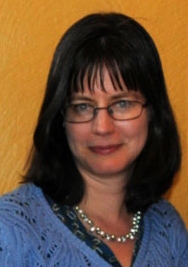- About Archives
- About SAA
- Careers
- Education
- Publications
- Advocacy
- Membership
 Professional Experience: Head, Medical Center Archives, NewYork-Presbyterian Hospital/Weill Cornell Medical Center, 2011‒present. Manager, Archives & Special Collections, University of California, San Francisco Library, 2002‒2011. Processing Coordinator, 1989‒2001; Archives Technician and Records Project Coordinator, 1987‒1989; Records Analyst, 1987‒1989, Alan Mason Chesney Medical Archives, Johns Hopkins Medical Institutions.
Professional Experience: Head, Medical Center Archives, NewYork-Presbyterian Hospital/Weill Cornell Medical Center, 2011‒present. Manager, Archives & Special Collections, University of California, San Francisco Library, 2002‒2011. Processing Coordinator, 1989‒2001; Archives Technician and Records Project Coordinator, 1987‒1989; Records Analyst, 1987‒1989, Alan Mason Chesney Medical Archives, Johns Hopkins Medical Institutions.
Education: MLA, History of Ideas, Johns Hopkins University, 1991. Graduate coursework in Library Science, University of Maryland, 1985‒1986. BA, History, Goucher College, 1984.
Professional Activities: SAA: Publications Board member, 2008‒2012; Science, Technology, Health Care Roundtable, Steering Committee 1993‒2008, Co-Chair 2001‒2003. Academy of Certified Archivists: Certified Archivist, 2001. Archivists & Librarians in the History of the Health Sciences (ALHHS): President 2008‒2010. Steering Committee 2007‒2011. Awards Committee 2006; 2011‒12 (chair). Website Committee 1999‒2008. Society of California Archivists: Education Committee 2006‒2007. Local Arrangements Committee 2006. Nominating Committee 2003‒04. Western Archives Institute Management Committee 2003.
Selected Presentations: “UC Faculty Papers: Identification and Appraisal” (panelist), C&U Section, SAA 2008. “Digitizing the Japanese Woodblock Print Collection at UCSF”, ALHHS 2007. “Ten Tips for Managing Archival Collections, or, What to do When you Can’t Do it All”, Medical Library Association 2006. “Facilitating Description: Developing Standard Series” (chair), SAA 2004. “Assisting Researchers and Protecting Privacy: Managing Access to Patient Information under the Health Insurance Portability and Accountability Act (HIPAA)” (chair/commentator), SAA 2002.
Selected Publications: “From Hahnemann’s Hand to Your Computer Screen: Building a Digital Homeopathy Collection”. Journal of the Medical Library Association 99(1), January 2011: 51‒56 (with K. Cameron). “Digitizing Patient Information and Laboratory Research Data for Archival Reference and Research.” Watermark Winter 1997. “Scholarly Returns: Patterns of Research in a Medical Archives.” Archivaria 41: 158‒187. Spring 1996 (with N. McCall). Designing Archival Programs to Advance Knowledge in the Health Fields. Baltimore: Johns Hopkins University Press, 1995 (with N. McCall).
Awards: University of Michigan Bentley Research Fellowship for the Study of Modern Archives, 1995 and 1996.
* * *
Question posed by the Nominating Committee: An essential component of the nomination and election process is identification of new leaders within SAA who embody the diversity of the archives profession. Describe what you believe to be the core responsibility of the members of the Nominating Committee, and outline your ideas for identifying the next generation of SAA leaders to ensure that new or distinctive voices and perspectives contribute to the future of the profession.
Any professional association thrives on the active participation of its members and their willingness to serve in elective office. SAA belongs to its members, and the members strengthen the organization through their involvement. Effective leaders and officers will engage a diverse range of the membership, and work to grow the Society by reaching out to potential new members.
The core responsibility of the Nominating Committee is to identify SAA members who are committed to working on behalf of SAA, advocating for archives, and growing the profession. As members of the Nominating Committee, it is our job to seek out individuals who bring a variety of perspectives to the table – from a diversity of socio-cultural backgrounds, geographic regions, types of institutions, and stages in their career. It is very important to involve newer members with a fresh perspective; it is equally important to engage long-time archivists who bring the wisdom born of experience. The members of the Committee have a responsibility to reach out to a diverse range of members in preparing the slate of candidates for election. A diversity of viewpoints will result in a richer, stronger organization.
My work in SAA and other professional organizations has connected me with a wide range of archivists. Serving on the SAA Publications Board has been an especially rewarding experience in that respect, providing the opportunity to interact with archivists from different types of institutions, diverse points of view, and with interests in myriad aspects of the archives profession. Through involvement in two regional associations, and as President of a small national association, I’ve forged strong professional and personal connections with archivists in different parts of the country, from diverse backgrounds, and at all stages of their careers.
As a member of the Nominating Committee I would work with the other members of the committee to seek out a balanced slate of candidates. The wider range of members that are called upon to serve, the better. Serving as an officer in SAA can be one of the most rewarding experiences of an archivist’s career. The Nominating Committee should strive to ensure that members from all walks of the archives life are presented with this opportunity.